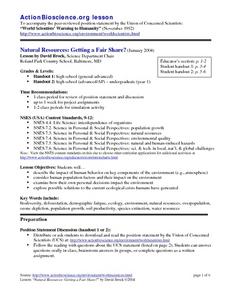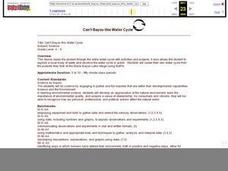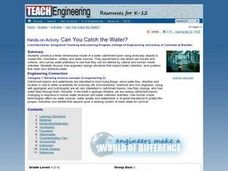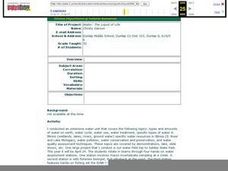Curated OER
Build an Anchialine Pond
Students explore biology by conducting a nature experiment. In this pond examination lesson, students utilize recycled materials, play-doh and water to recreate a pond and its inhabitants. Students identify the different elements within...
Curated OER
Water Quality and Nitrates & Phosphates
Pupils examine the effects of nitrates and phosphates on the dissolved oxygen levels in different water sources. In this series of 3 lessons, they consider the reasons for nitrate and phosphate level increases and their effects on...
K12 Reader
United States Geography
Encourage reading for information with a text about United States geography. Kids read a short passage about the landforms in the United States, including mountain ranges and natural resources, and answer five reading comprehension...
Teach Engineering
Red Cabbage Chemistry
Using the natural pH indicator of red cabbage juice, groups determine the pH of different everyday liquids. As they work, pupils gain an understanding of pH that may help deal with contaminants in the water supply.
Curated OER
Erosion: Natural or Unnatural
Young scholars explore how water has the power to erode, how developing the land (building roads, buildings and parking lots) increases the amount of water reaching our rivers, and how this greater quantity of water increases erosion....
Curated OER
Runoff: Intro to Watersheds
Learners are taught that a watershed is, what types of basic land cover are impermeable and permeable to water. They trace the flow of water around their school and around their home. Students determine what watershed their school is a...
Curated OER
The Water Dilemma
Students read about and discuss the importance of easily available, clean drinking water. They participate in a role play scenario in which only one drinking fountain in the school has potable water.
Curated OER
Water Quality
Students investigate the water cycle and evaporation. They study the porosity and permeability of groundwater, and the capillary action in soil in this unit.
Curated OER
Parched! No Water, No Town
Young scholars discuss the benefits of water conservation. Given a data sheet, they document their water usage over a specified period. Water usage data is graphed and analyzed. Students discuss ways in which they can conserve water.
Curated OER
Natural Resources: Getting a Fair Share?
Students explore the impact of human behavior on key components of the environment, examine how theirn own personal decisions have added to the problem, and explore possible solutions to the current ecological crisis.
Curated OER
Can't Bayou this Water Cycle
Students identify the stages in the water cycle. They observe a local water source and view the cycle in action. They create their own water cycle using software.
Curated OER
Water Pollution Graphing Activity
Students describe and identify the link between land use activities within a watershed and water quality. They evaluate the quality of a "water sample" ( a bag of skittles), graph their results, and form a hypothesis about the land use...
Curated OER
Are You Thirsty: The Effects of Pollution on Drinking Water
Middle schoolers discuss the different causes of water pollution. In this ecology lesson, students brainstorm ways to purify polluted water. They formulate their conclusion based on the results of the experiments.
Curated OER
Natural Wonders
In this natural wonders worksheet, student unscramble words, using lyrics to a song titled "Natural Wonders." An answer key is included on page 3. No song link is given.
Curated OER
"Tri-County" Project--Water Cycle
Students analyze the parts of the water cycle through research and experimentation. Particular attention is paid to the processes of evaporation and condensation.
Curated OER
The Water in Our Lives: Kit Practice
Learners examine a local water source using testing kits to determine water qualitiy. They identify the pollutants and contaminants in each sample. They determine if samples fall within an acceptable range for drinking water.
Curated OER
Can You Catch the Water?
Students work together to construct a model of a water catchment basin. They survey water patterns and complete experiments to see where rain travels and collects. They discover how engineers design structures that help with drainage.
Curated OER
Water Pollution Lesson Plan: Don't Trust Your Eyes
Students develop a list of actions they could perform that would protect our water resources from pollution. They formulate hypotheses, conduct experiments and draw conclusions about actual pollutants found in our water supply.
Curated OER
Precious Water: Is it a Need, a Right, or a Commodity?
Students determine whether water is a need, a right, or a commodity. For this water lesson, students investigate land and water ecosystems through activities. Students also discover water as a resource and energy source as they observe...
Curated OER
Water You Can Use from the Air Conditioner
Students work together to research water quantity, quality and safety standards. They complete a lab to discover how to use the water from an air conditioner. They write a paper to show their findings.
Curated OER
Water: The Liquid of Life
Sixth graders complete a lesson on the properties, types and amounts of water on Earth. In groups, they travel between stations to identify water resources in Illinois and pollution sources. They complete the lesson with a field trip...
Curated OER
Arsenic Contamination: Water Filtration
Students work in groups to design a filtration process that will separate clean water from polluted water. They organize data in tables or graphs and present their findings to the class. Students identify further safety protocols that...
Curated OER
Water Pollution
Fifth graders examine what contaminated water looks like, and how it becomes polluted. They examine a teacher demonstration of water is not polluted but does contain rocks and other things that do need to be cleaned out before drinking...
National Institute of Open Schooling
Heavy Metal Contamination
An informative lesson focuses on heavy metal contamination of environments. Classes read about, discuss, and answer questions pertaining to sources of heavy metals in the environment. To finish the 35th installment of 36, individuals...

























